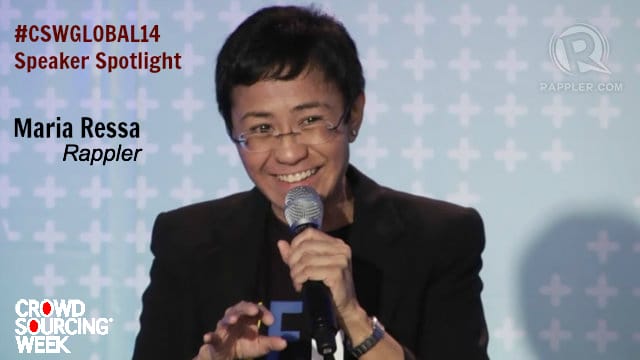Registered attendees for Crowdsourcing Week Global ’14 already represent over 17 countries across 5 continents so far. To give you a little taste of what to expect at the conference, we are bringing a new ‘Speaker Spotlight’ series that showcases speakers’ work and their plans for CSW’14 and beyond. Maria Ressa is an ace journalist and Founder & CEO of
Rappler, a social news network where stories inspire community engagement and digitally fuelled actions for social change. Rappler comes from the root words “rap” (to discuss) + “ripple” (to make waves). It’s a new world of limitless collaboration enabled by new technology and connected by social media.
1) Tell us a little bit about your talk at Crowdsourcing Week Global 2014 / What message are you bringing to the global stage in Singapore? / Why should people attend?
Harnessing the power of the crowd has tremendous implications for every industry and governance. In the Philippines, we’ve been able to use it for greater transparency in our democracy, to help evolve discussions on critical issues as well as real-time reporting and responses during states of emergency. It’s a revolutionary tool that gives a new paradigm for solving age-old problems. Crowdsourcing Week is one of the few opportunities we in Asia have to discuss new practices with others experimenting and succeeding with crowdsourcing.
2) What are the big changes you see coming to crowd-centric practices in Asia in the next 5 years?
Crowdsourcing is in its infancy in Asia, but it promises to strengthen governance and help bring real power to real people.
3) What is the one area in crowdsourcing that has you most excited and why?
Journalism and civic engagement through big data. It’s a brave new world of endless possibilities – all of which give new power to citizens, who – armed with information – can work collaboratively with other stakeholders to solve age-old problems and strengthen democratic processes. The growth of social media has trounced the powerful gate-keeping power of traditional media and democratized information. Now we no longer need expensive equipment and corporate structures to ripple a message through society.
4) How is crowdsourcing transforming your business and more largely, your industry?
Technology gives journalists new power. Instead of complaining about the dramatic shifts in our industry, we celebrate it because it provides new ways of solving age-old problems that allow journalists to go far beyond storytelling.
In a country like the Philippines, where institutions are weak and corruption is endemic, we can capture the zeitgeist of a frustrated society, push action and help build institutions bottom-up. Using a patented user-engagement model, we link the main components into a cycle driving action. Content creation is amplified by social media, which allows engagement that leads to crowdsourcing. The most immediate easy action is to click how you feel – a mood meter with every story, and every mood vote is aggregated into a mood navigator that displays the top 10 stories (with the most number of votes) and the crowdsourced mood of the day. Pulling all that data together, you can see trends in months and years – only one of the strands of big data we monitor, giving more insight to the public we serve.
——
Join us for Maria’s session on Tuesday, April 8 at Crowdsourcing Week Global ’14 – register here.




0 Comments